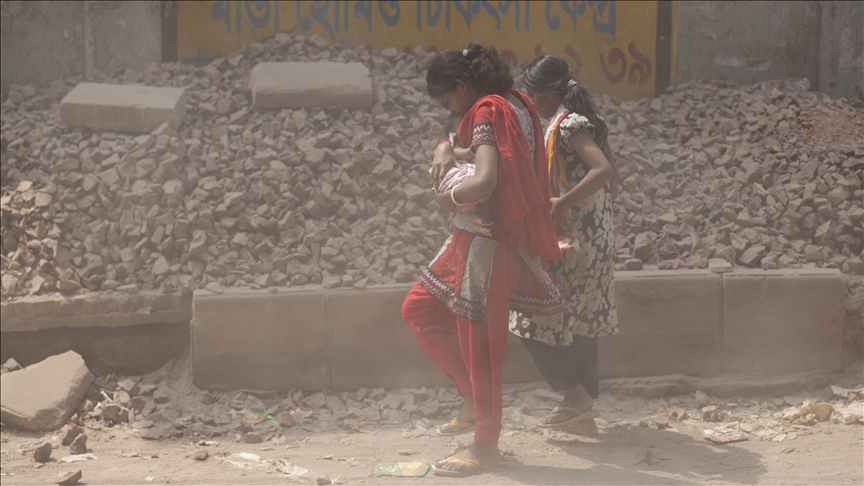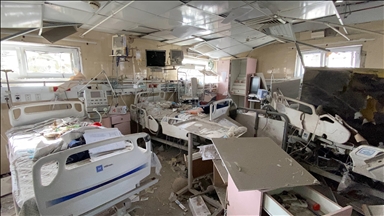Air pollution adversely affects expectant women in Bangladesh
Air pollution causes multiple health problems for women in Dhaka, most serious of which are underweight birth, premature birth, and high newborn mortality

Bangladesh
DHAKA, Bangladesh
Tanzila Nasrin was pleased that her two-month-old son gained weight after she sought advice from a pediatrician, who assisted her newborn. Her son was born underweight, as were thousands of other babies in Dhaka, Bangladesh's capital, due to one reason – air pollution.
Nasrin, a 28-year-old textile engineer living in the megacity's Mirpu-1 neighborhood, gave birth to a baby boy weighing less than 2.5 kg (5.5 pounds), a low-birth-weight infant.
She was initially upset, but she is now relieved because her son has gained weight by following the pediatrician's advice. "My doctor was always concerned about my healthy breathing during the pregnancy because Dhaka air is unhealthy," she told Anadolu.
Bangladesh requires immediate action to reduce air pollution, which accounts for 20% of all premature deaths in the country, according to the World Bank's latest report released on Tuesday.
The World Bank stated in its previous report published in December last year that the sites with major construction and persistent traffic in Dhaka have the highest level of air pollution. The fine particulate matter (PM 2.5) at these sites is on average 150% higher than the WHO Air Quality Guidelines (AQG).
The second highest concentration of PM 2.5 levels is found near brick kilns in Greater Dhaka, which is 136% above the WHO AQG, it added.
Air pollution causes multiple health problems for city residents, the most serious of which are underweight birth, premature birth, and high newborn mortality.
Effect on expectant mothers
A new study published in The Journal of Climate Change and Health found that mothers exposed to high levels of air pollution during pregnancy had a higher rate of low birth weight in 3,206 babies born in Dhaka between 2014 and 2017.
The study's lead author, Mahin Al Nahian, a research investigator at Initiatives for Climate Change and Health section of the International Centre for Diarrhoeal Disease Research, Bangladesh (icddr,b), said they measured mother's air pollution exposure by accumulating the air quality index value for the pregnancy period.
"We found 20% low birth weight babies from mothers who had low air pollution and 36% low birth weight babies from mothers who had higher air pollution," he told Anadolu.
The same was true for premature birth outcomes in the study, he said, adding that among mothers who experienced lower levels of air pollution during their pregnancy, the rate of premature birth was 9%, while among mothers who faced higher levels, the rate was 15.2%.
According to the study, there is a 6.2% increase in premature birth between the lowest and highest cumulative air quality index values.
"We tried to examine the relationship between air pollution and birth outcome, and we have some findings that are critical, given the impact of poor air quality on mothers and newborn babies," he added.
Polluted air or the presence of particles in the air reduces the human capacity to inhale oxygen, said Dr. Ferdousi Begum, a well-known gynecologist, and professor at Birdem General Hospital and Ibrahim Medical College.
If pregnant mothers do not get enough oxygen, it directly affects the babies, as oxygen is required for normal physical and mental growth in the prenatal chamber, she told Anadolu.
According to the gynecologist, breathing unhealthy air or getting less oxygen causes metabolic disorders, and hypertension, and reduces the woman's fertility and ability to give birth to healthy babies.
"Air pollution can cause premature delivery with low birth weight or underweight newborn with on-time delivery," Dr. Ferdousi, who is also the president of the Obstetrical and Gynecological Society of Bangladesh, explained.
City management
Researchers have identified multiple causes of high-level air pollution in Dhaka, including waste dumping, uncontrolled construction work, vehicular emissions, industrial wastewater disposal, and a lack of knowledge about plastic waste management.
According to another research report published earlier this month in the international science journal Environmental Research Letters, Dhaka ranks second worst in the world in terms of methane emissions in the air.
Abdus Salam, a chemistry professor at Dhaka University who has been studying the country's air pollution for the last two decades, told Anadolu that the presence of methane gas in Dhaka's air causes global warming, with temperature rise causing more diseases to spread quickly among city dwellers.
"Air pollution is also linked to the birth of an increasing number of physically challenged or disabled children in Bangladesh," he added.
Government working to improve air quality
Ziaul Haque, director of the Environment Department, also acknowledged the study findings, saying they have begun assessing the reports and will take appropriate action.
The Dhaka North City Corporation is working to convert 3,000 metric tons of waste per day into energy, while a waste-to-compost system is being developed in the capital's Matuail area to improve waste management, the senior official told Anadolu.
"Once the projects start operating and the works of mega development projects in Dhaka like metro rail, underpass, and flyover are completed, the air quality would improve significantly," he asserted, emphasizing cooperation among government agencies to improve waste management.
The government has also formed a committee, chaired by the cabinet secretary, to implement the recently passed Air Pollution Control Rules-2022 to curb air pollution by enforcing it in the field, he said, hoping that it will improve the situation.
Anadolu Agency website contains only a portion of the news stories offered to subscribers in the AA News Broadcasting System (HAS), and in summarized form. Please contact us for subscription options.




